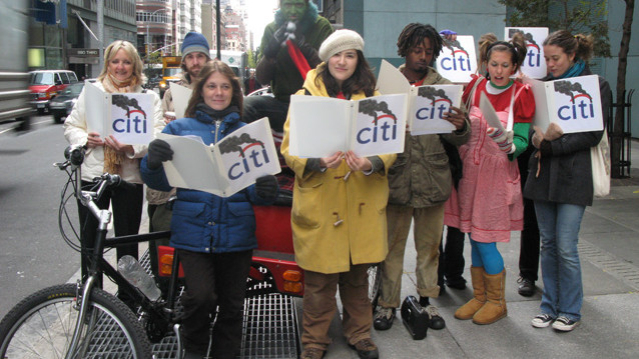Partner News
Things you need to know about Citi’s underwhelming coal policy
Citi's response to global crisis is half measures.
2019-01-31
Linda Capato Jr. - Rainforest Action Network

Thousands of activists in more than 50 cities across the U.S. to protested Citi and Bank of America’s investments in new coal-fired power plants and dirty coal extraction methods such as mountaintop removal coal mining.. Photo: Rainforest Action Network
2019-01-31
Linda Capato Jr. - Rainforest Action Network
This is a guest blog post by Linda Capato Jr. of Rainforest Action Network. It is reposted with permission from the original here.
You may have missed it- but Citi has finally released their policy on funding coal power…and we’re pretty sure you won’t be shocked to know, it is underwhelming.
Citi was the #1 US banker of coal power in 2017 (the latest year for which we have complete data). We and other folks from around the world really did expect Citi to step up to the demand to finally fully commit to defund coal.
A few fast facts on what they just released:
- Quietly releasing their coal policy (they just hid it in the update of an existing document, without even an official announcement) is, to us, an admission that they are not going far enough. RAN and others have campaigned to push Citi to be a leader on one of the worst forms of energy, coal. As clearly defined in the most recent IPCC report: we are running out of time to curb the worst impacts of climate change. Citi needed to step it up.
- No restriction on corporate financing: This is by far the biggest loophole to their new policy. This allows Citi to finance companies who are directly building coal plants and projects as long as the company is paying for it out of their general operating funds. This means there is no restriction on companies using Citi’s money to fund exactly what the policy is “attempting” to curb. In fact, looking at the numbers from the last few years, this new policy wouldn’t apply to 94% of Citi’s financing for new coal power.
- “Solving Energy Poverty” through coal power: This is one of the more frustrating pieces of this policy. Citi says they won’t finance specific coal plants, except to “address situations of energy poverty”. But energy poverty is driven by lack of access to a grid — largely because of the placement of said communities and many other socioeconomic issues. Using coal powered power plants to bring power to these communities is a massive undertaking compared to say, decentralized solar or clean energy solutions. It is a no brainer that coal adds to greenhouse gas emissions and to massive health problems in communities where coal is burned. The solution to “energy poverty” is bringing clean energy to electrify communities, not to repeat the same mistakes countries like the US has made by harming communities and exacerbating climate change.
- This policy pales in comparison to other global bank policies. While we aren’t excited about comparing the worst with the bad –– the truth is Citi’s policy isn’t even close to bold compared to similar banks. Right now, 20 banks won’t fund specific coal plants anywhere in the world — unlike Citi, which has a big loophole. And 13 banks have specific policies that restrict the corporate financing that Citi’s policy allows. Even when comparing to banks that have been lagging, Citi’s policy is worse.
- This is such a missed opportunity. The IPCC has made what we’ve known for years, abundantly clear. We can’t have loopholes, we can’t have exceptions, we must stop expanding fossil fuels and phase out the use of all fossil fuels by 2050. Citi has chosen their first public policy since this damning report was released to fall short. They have missed an incredible opportunity to take a leadership role against our global crisis.
Check out RAN’s full take on the policy here.
Banks
